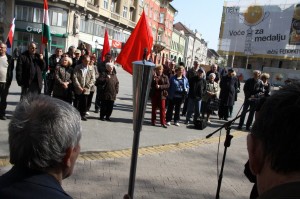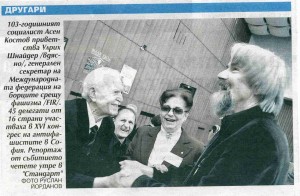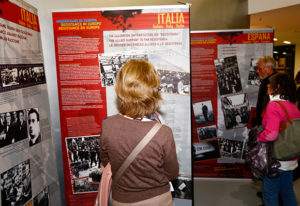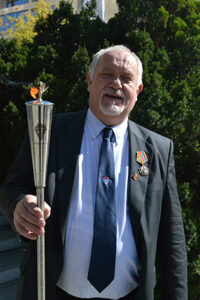On its way from Bulgaria to Hungaria the torch of FIR has been hosted by SUBNOR Serbia
The torch of FIR in Serbia
31. März 2014
Stop extreme right and neo-fascist forces in Europe!
31. März 2014
FIR expresses its great concern about the current situation in Europe, where extreme right and neo-fascist forces gain massive influence in countries of the European Union and outside the EU. For example, in Hungary they give the keywords for chauvinistic and racist policy, in Poland they exclude social minorities, in the Baltic states they operate with historical revisionism and in Ukraine – supported by representatives of European govenments, USA and NATO – neo-fascist and far-right forces get great influence in the current administration, which has been formed outside the Constitution law. Such policy is directed against social and national minorities and stands for war and expansionism.
FIR deplore that representatives of the European Union recognize such forces and massively promote such groups. Our idea of Europe is linked with the tradition of anti-fascist resistance, a Europe that ensures the social and political rights of all people. Therefore, we demand a clear attitude of all European authorities against extreme – right tendencies and neo-nazi groups in all European countries.
Vote for anti-fascists in the European Parliament !
8. Februar 2014
Europa, Europawahl, European Parliament
Call of FIR: Appeal for the European election campaign
In May 2014, the European Parliament elections take place . For veterans of the anti-fascist struggle and anti- fascists of today’s generations , these elections are important of two main reasons:
The current policy and development of the European Union does not correspond to the interests of large groups of people in the European countries. Numerous decisions lead to massive social exclusion, have disastrous consequences for the weakest of the respective countries. Therefore in the European Parliament , the votes must be strengthened , committed to a democratic , peace-oriented , solidarity and socially just development of Europe.
Secondly in various European countries racist and extreme right-wing forces growing up by the elections , which must be countered active and engaged in the election campaign and in Parliament.
FIR therefore calls on you in the European election campaigns to chose in all countries such men and women who work for a Europe
-
that confronts any form of racial discrimination or xenophobia,
-
that is an advocate for refugees and guarantees humane treatment,
-
that campaigns against all forms of Holocaust denial , historical revision and rehabilitation of SS criminals,
-
that ensures a social policy, which guarantees work, education, food and adequate housing for all human,
-
that stands for a policy of peace , based not on hegemony , but on non-military solutions to conflicts,
-
that represents a community for the interest of the people and not the rule of banks and business associations,
-
that stands for comparable living conditions in all countries and against forced labor migration,
-
that guarantees equality between peoples and nations, and no hegemonic policy .
Such an Europe is possible when the people stand up active and loud for their interests.
900 days – unforgettable
24. Januar 2014
The International Federation of Resistance Fighters (FIR ) – Association of antifascists sent to the inhabitants of the Hero City Leningrad, now St. Petersburg, and the veterans of the Soviet Army, best wishes on the occasion of the 70th Anniversary of the liberation of the city by breaking through the blockade on 27 Januar 1944.
The 900 days of blockade by the fascist armed forces brought untold suffering , death and destruction over the city. Nevertheless, people have fought in Leningrad almost three years heroically and – in that way – they resisted not only the fascist beast , but set also a visible sign for all the world that the ” invincible ” Wehrmacht reached its limits .
In the same time, the heroic deeds of the Soviet Army , organizing in the winter supplies for people across the frozen Baltic Sea and blowing up the blockade ring in January 1944 , are unforgettable.
We commemorate the more than one million victims of the blockade and honor the heroes who have sacrified their lives for the liberation from fascism .
First report in Bulgarian news-paper
8. Oktober 2013
Successful congress in Sofia
7. Oktober 2013
Highlights were e.g. the commemorative event for the 60th anniversary of FIR in July 2011 in the Old Town Hall of Vienna and the Michel Vanderborght Award in the ballroom of the Belgian Parliament in 2013. We have also to mention the International Youth Meeting “The train of Thousand” in May 2012 in Auschwitz (together with the Institute of Vétérans and the Auschwitz Foundation). Two important products for historical work were the publication of the “Map of the Nazi camps and prisons in Central Europe” and the opening of the exhibition “European resistance fight” in summer 2013 at the European Parliament in Brussels. Both projects could also be realized with the Institute of Vétérans .
The speeches of delegates and guests showed that the FIR lives particular by the activities of its member associations and their vital contacts under each other. This was visible by meetings with board members of FIR with associations in different parts of the world.
The high regard of FIR could be seen in this context e.g. the meetings of FIR President with the Presidents of the Republic of Cyprus and the Czech Republic, or with political representatives of other states. Letters and greetings of partner organizations gave the same impression . The Chairman of the Socialist Group in the European Parliament and European Parliament President of the Bulgarian National Assembly , Sergei Stanishev , sent a detailed message, in which he stressed the importance of the FIR .
Neo-fascism and racism are a big challenge for all member associations of the FIR . Vilmos Hanti (Hungary ), President of the FIR , has been repeatedly targeted in attacks of the extreme right . In Greece one could see the murderous dimension of neo-fascism . Thatr is why the delegates suggested international anti-fascist initiatives. Against open revision of history and the rehabilitation of the SS in the Baltic republics , FIR will demonstrate together with anti-fascist forces in the region in the spring of 2014 on the spot.
Never again fascism , never again war! – is FIR’s obligation for today . Therefore, they called on all peace-loving forces to prevent an imminent American military strike against Syria and to work for a non-military solution of the conflict.
It is noteworthy that at this Congress two organizations returned to an active work in FIR , the Czech Freedom Fighters Association and the Italian ANPI . Thus continues the trend of recent years , the FIR is also seen in the seventh decade of its existence as an active and necessary international umbrella organization of former veterans federations and current anti-fascist structures. Chosen with great unanimity , the new leadership team will make its contribution to this.
At the conclusion of the Congress , the Bulgarian Antifascist Union organized an excursion to Sofia, among other things, to the grave and birthplace of Georgi Dimitrov . For the delegates of the FIR Congress it was a concern , to honor together this great anti-fascists whose occurrence before the Leipzig Reichstag fire process and at the VII World Congress of the Communist International is unforgotten .
XVI regular FIR – Congress in Sofia
28. September 2013
Invited by the Bulgarian antifascist Union we have the possibility to held our next regular congress of FIR in Sofia, the town of Georgii Dimitrov. In the last weeks all member federations received the written invitation for the FIR-congress from October 5/6, 2013 in Sofia. Since the XV regular congress in Berlin we could experience a number of important developments of the political work. Activities like the ceremony for the 60th anniversary, the international youth meeting in Auschwitz, the ceremony of the Michel-Vanderborght-Award and the opening of the exhibition “European resistance” underlined the importance of the work of FIR. The actual political tendencies of right-wing development f.e. in Hungary and the up-growing of extreme right-wing groups shows the necessity of a strong and authorized to act organization.
Agenda
-
Political report of the president and the executive committee
-
Discussion about the work of the past years and planning of new projects
-
Election of the leading committees
-
Resolutions to political declaration and other request
Exhibition “European resistance movement” in the European Parliament
24. September 2013
Europe, INIG, Resistance fight
8 July 2013 opened in the foyer of the European Parliament, the joint exhibition of the Institut des Vétérans and the International Federation of Resistance Fighters (FIR) – Association of Anti-Fascists about the “European resistance movement against Nazism” on invitation of the Vice-President of the European Parliament Miguel Angel Martinez and in presence of numerous members of the European Parliament, of employees but also of guests from the international anti-fascist organizations. The exhibition includes 50 panels for all European countries at that time were they have been involved in the fight against Nazism: Italy, Spain, Portugal, Germany, Austria, Czechoslovakia, Poland, Norway, Denmark, Belgium, Netherlands, Luxembourg, France, Great Britain, Soviet Union, Hungary, Albania, Yugoslavia, Greece, Bulgaria and Romania.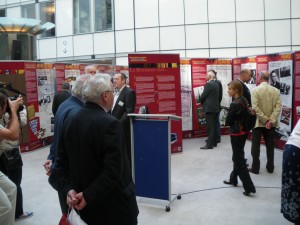
The exhibition lives through impressive images and reproduced documents that underscore the small explanatory texts. In the selection of illustrations, which have often been given by the national associations of resistance fighters and anti-fascists, such images were particularly chosen, they show men and women of the resistance movement, they were able to express national characteristics of the combat and general trends. So you can find photos of the Slovak National Uprising, the Copenhagen general strikes, the Yugoslav partisan armies or the leaflet of the Communist Party of 1938 “Against the Jewish pogroms,” one of the few examples of public protest against the anti-Semitic attacks in Germany. The exhibition of course does not exhaustive, but it shows that the resistance movement has taken place in all European countries in different shapes and taking into account national peculiarities. All texts are available in three languages (English, French, Dutch).
FIR awarded Michel-Vanderborght Price
24. September 2013
On an impressive ceremony at the second weekend of July the International Federation of Resistance Fighters (FIR) – Association of Anti-Fascists awarded the Michel Vanderborght Price in the ballroom of the Belgian Parliament in Brussels to eight personalities and initiatives. This prize, named after the Belgian Partisans and last president of the FIR, should honor those, which have been in accordance with the ideals of the anti-fascist resistance engaged for the preservation of historical memory, the social and political interests of the survivors and for the continuation of the anti-fascist legacy distinguished by special engagement against old and new Nazis.
At the opening of the ceremony spoke André Flahaut, President of the Belgian Parliament. He praised the merits of Michel Vanderborght and stressed how important today is the common democratic and anti-fascist resistance against extreme right and populist movements in various European countries. He stressed that the memory of the resistance was not only a historic task, but a responsibility to future generations to preserve the ideals of democracy, freedom and humanism.
After a short address by the President of the FIR Vilmos Hanti, who explained the intention of the price once again, the awards were given to the honorees. It was a Belgian national institution that has made a special contribution to the teaching of history, a Bulgarian historian who has made against the political mainstream preserving the memory of the resistance to the task for many years, a German initiative, that organizes financial and moral support for former forced laborers, a Greek painter, expressing in his pictures the experience of the anti-fascist struggle, an Israeli partisan who campained especially for the memory of the Jewish fighters, an anti-fascist committed journalist from Italy and – as a political feature – the representatives of the 13th Municipality of Budapest, oppose engaged the right mainstream of Fidesz and Jobbik in Hungary. In his acceptance speech, the mayor of the district underlined this recognition of the FIR as important to its actual political work.
By the Michel Vanderborght price of FIR these initiatives and volunteers were given thanks and appreciation of the international anti-fascist movement. In which tradition the organization and its award winners stands, documented the Institute of Vétérans and the FIR, presenting to the guests in the framework programm some exhibition boards of the first comprehensive exhibition about the anti-fascist resistance movement in Europe, which has been opened for the first time at the next day in the premises of the European Parliament.
75 Years International Brigades in Spain
1. Januar 2012
We wish all comrades, friends and combatants a good and peaceful New Year 2012.
Nous souhaitons à tous les camarades, amis et alliés une bonne et paisible nouvelle année 2012.
Wir wünschen allen Kameradinnen und Kameraden, Freunden und Mitstreitern ein gutes und friedliches Jahr 2012.
Vilmos Hanti (President)
Dr. Ulrich Schneider (General secretary)

